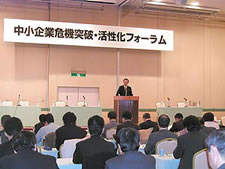| Forum to Stimulate Sm./Mid-Size
Business in Crisis Demand Activities on Ministries/Agencies/Employers Org. (3 March 2003) |
||
On February 25, RENGO held its “Breakthrough
the Crisis/Stimulate Small to Mid-Sized Businesses Forum” at a hotel
in Tokyo. Unlike previous forums whose main themes were ‘deferential
corrections,’ this year was different. At this forum attendees had
to think about activities that would break through critical conditions
and revitalize small to mid-sized businesses before they could consider
even correct deferentials. Approximately 220 people from affiliated organizations
and local RENGO attended the forum. Officials in charge of the Small and
Medium Enterprise Agency and representatives from the Tokyo Chamber of
Commerce and Industry also participated in the forum’s discussions.
After the forum, participants divided into six groups and conducted demand
activities at related ministries and agencies, employers associations
and the Japanese Bankers Association in order to boost and expand measures
for small to mid-sized businesses.
In conclusion, Sasamori talked about future RENGO labor movements. He closed by offering the following appeal: “it is no longer a time when you can say what you want without needing to obtain answers. Now you must draw answers and those answers must lead to stepped-up movements.” Afterward, Small to Mid-sized Unions Joint Struggle Center Vice President Hirasawa gave a speech on behalf of the Center. He said, “we see no signs of small/mid/local business bankruptcy slow downs. The employment situation will undoubtedly grow far more severe when bad loan disposal accelerates. ‘The Government-Labor-Management Agreement on Employment Problems’ was reached on December 4 but will only be effective when each of the tripartite fulfill their roles. Each are required not to generate any more unemployed.” Then there was a lecture from Small and Medium Enterprise Agency, Policy Planning Division Manager Funaki on government support measures for small to mid-sized businesses based on the ‘Industrial Revitalization Corporation Establishment Bill’ scheduled for deliberation at the current Diet session. Afterwards, the forum proceeded to a panel discussion on ‘Stimulation of Small to Mid-Sized Businesses.’ Panelists from Tokyo Chamber of Commerce and Industry, Industrial Policy Division Manager Matsumoto, representatives from JAM (Japanese Association of Metal, Machinery & Manufacturing Workers’ Union), RENGO-Saitama, RENGO-Osaka, and RENGO Headquarters each exchanged opinions on actual conditions and problems. Also, representatives from UI ZENSEN DOMEI (the Japanese Federation of Textile, Chemical, Food, Commercial, Service and General Workers’ Unions), JAM, and RENGO-Saitama each gave reports on case-studies. In their report, a union representative informed the audience about the difficulties facing small to mid-sized businesses in fund-raising due to a reluctance of banks to extend new loans and withdraw capital as well as about the actual status of workers who cannot avoid performing unpaid overtime. Meanwhile, a representative from an employer’s organization pointed out the need to promote deregulation and develop new industries saying, “we must foster new industries. I want active businesses to be more active and advance the successful transformation of industrial structure. RENGO Department of Working Conditions Executive Director Tatsui summarized the discussion strongly calling on labor to raise such issues as fortifying measures for business relation rules and developing new networks in line with new industrial structures, in addition to a need for working condition rules. |
|
